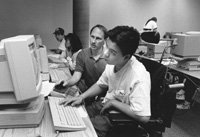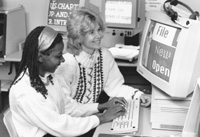Tips For Teaching

To be most effective your Internet activities should be fun, engaging, and educational. Regardless of age, interests, abilities, and disabilities, all campers should actively participate. This section helps you realize these goals. While working with campers, be sure to adjust to different learning styles - in other words, the different ways in which students take in and process information.
The Internet offers opportunities to meet the diverse learning needs of your students. Some campers may be more comfortable using a site where they can manipulate objects right on the screen; other students might be more comfortable doing at least some work off-line. Lessons that use the Internet have the capacity to shift the focus from teaching to learning and place much of the responsibility for learning on the student. You can concentrate on individual learners rather than full class instruction.
Multiple Intelligences and Learning Styles
Howard Gardner, a professor at Harvard University, has developed a theory of multiple intelligences, suggesting that there is great variability in types of intelligences that are developed at different times, in different ways, and to different levels. These natural talents or affinities make it easier for different people to learn different things. For example, some people find music easy to learn; some do not. Some express themselves best verbally; others do not. Gardner actually identifies eight such intelligences:
- Musical Intelligence - This intelligence is possessed by a camper who thinks in musical terms and tends to learn best when music and/or musical-type patterns are used.
- Naturalistic Intelligence - A camper with naturalistic intelligence has the ability to connect to the environment and categorize objects.
- Verbal/Linguistic Intelligence - A camper with this intelligence enjoys working with words.
- Mathematical/Logical Intelligence - A camper with this intelligence enjoys puzzles, logic problems, and sequences.
- Spacial Intelligence - This intelligence is evident in a camper who can easily visual- ize objects and situations in his mind.
- Interpersonal Intelligence - A camper who works well with others has strong interpersonal intelligence.
- Bodily Kinesthetic Intelligence - A camper with this type of intelligence uses her whole body to solve a problem and prefers projects which allow her to move and manipulate objects.
With its multi-media capabilities, the Internet is an excellent tool for a group of children with a wide variety of learning styles and intelligence strengths. For more information on learning styles and multiple intelligences, consult the following Web sites:
- Learning Styles
educationdesignsinc.com/index-of-learning-styles/ - Multiple Intelligences, University of New Orleans
journals.sagepub.com/doi/pdf/10.1177/073724770503000303 - New Horizons for Learning
www.newhorizons.org/trm_gardner.html - Selected ERIC Abstracts
eric.ed.gov/?id=EJ633280
Even if your camp is not specifically designed for children or youth with disabilities, you can assume that at least some of your campers will have disabilities - some visible, some not. The Americans with Disabilities Act (ADA) does not allow programs to discriminate on the basis of disabilities and requires that reasonable accommodations be made to allow people with disabilities to participate. Although accommodations vary widely, a little advance planning on your part will allow you to respond appropriately and quickly to the specific needs of your campers. Consider both teaching and technical issues.
Following these guidelines helps maximize the participation of all campers. They reflect a sensitivity to the potential presence of a wide variety of disabilities including blindness, low vision, hearing impairment, mobility impairment, health impairment, attention deficit disorder, and specific learning disability.

Presentation
Many teachers start their lessons with a presentation to introduce new material. To best communicate with campers, regardless of abilities and disabilities, consider applying the following teaching tips into your presentation.
- Greet students individually as they enter your area. Introduce yourself, wear a large- print name tag, and ask their name. Make sure everyone feels welcome.
- Speak clearly and slowly.
- Incorporate as many senses as possible in your instruction - visual, auditory, and tactile. For example, use visual aids, verbal descriptions, and object manipulation.
- Face participants when you speak and keep your face, particularly your mouth, visible.
- Describe visual aides and demonstrations verbally. For example, say "the 3-inch steel rod" instead of "this."
- Use language that is easily understood. If you introduce an unusual or difficult word, spell and define it orally and write it on the blackboard or overhead projector. To explain a new term or process, use analogies that campers will understand.
- Ask campers to help you set up and distribute handouts or demonstrate a concept; they enjoy being involved.
- Convey enthusiasm about the activity by sharing personal and/or humorous anecdotes or stories about your life or work experiences.
- Ask camp staff to produce handouts in Braille and large print for campers with visual impairments.

Discussion
Allowing campers to share their experiences and discuss their ideas is important. The guidelines below can help you incorporate lively discussions into your sessions.
- Include time for discussion. Encourage campers to contribute their ideas.
- Repeat questions and comments to ensure that all campers can hear what is being said.
- Before calling on a camper allow time for participants to think about the question and formulate responses.
- Allow campers with speech impairments to participate in group discussions. If you do not understand what is being said, ask the person to repeat. Often, other campers can help you understand what the child is saying.
- Call on campers verbally and with gestures so that students with visual or hearing impairments know that they are being addressed.
- Write key points on an overhead projector, flip chart, or blackboard.
- If there is a sign language interpreter in the room, direct comments to the camper, not the interpreter. The interpreter only performs the function of a camper's ears and/or voice.
Certificates and Prizes
Prizes and certificates can add fun to your program and a sense of accomplishment for your campers. There is one rule to follow when prizes are involved - try to make everyone a winner! So, if a grand prize is awarded for exceptional achievement, have smaller prizes for everyone who participated. Younger campers always enjoy reward stickers; some older campers do, too. At the end of a comprehensive program, a formal certificate of achievement is appropriate. Try ending the program on a light note with funny awards (Who was the "Best Dressed" camper anyway? And, who was the "Most Persistent Internet Explorer"?).